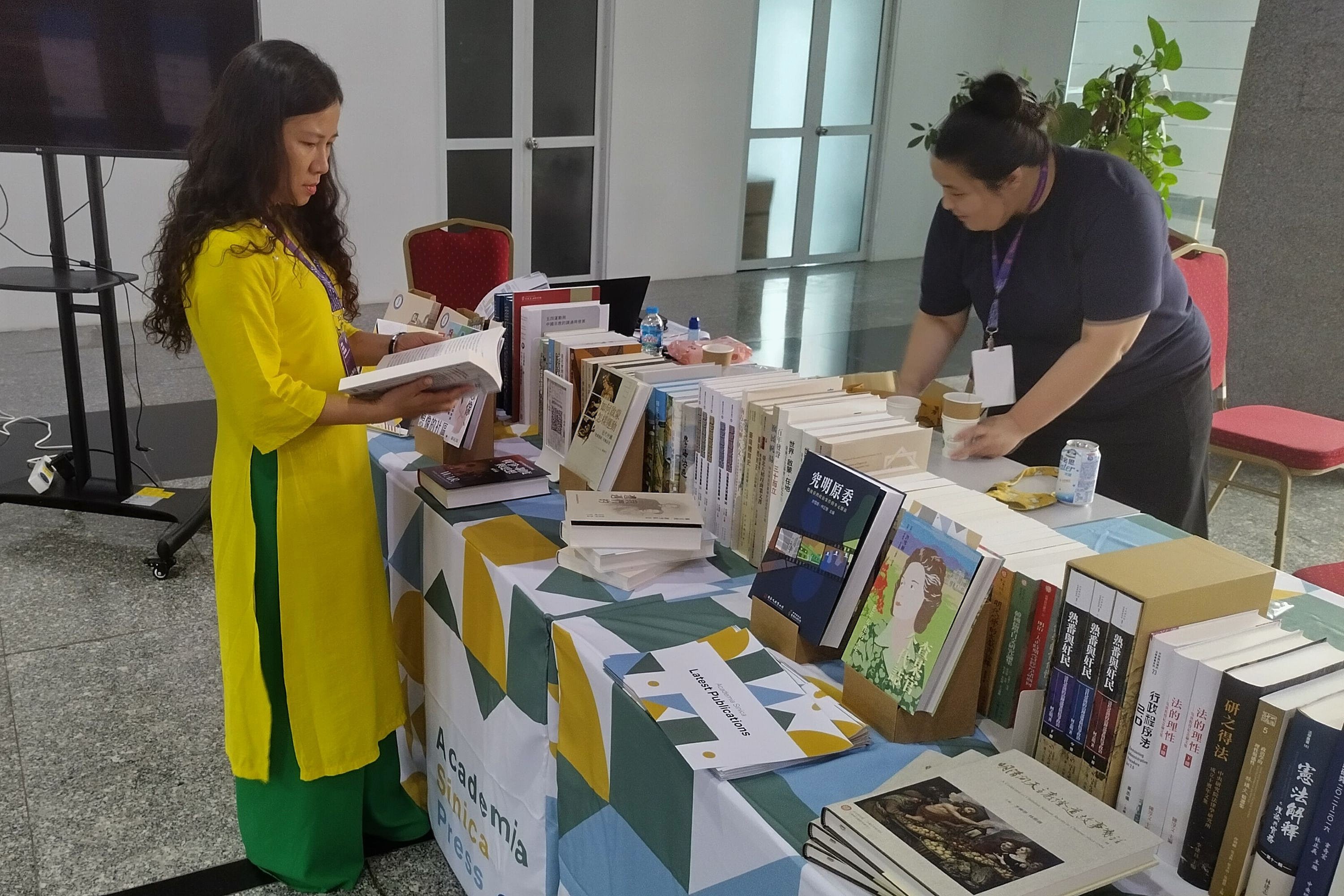Date: 2025-09-23
This year marks the 32nd year of the Pacific Neighborhood Consortium (PNC) Annual Conference and Joint Meetings. Vice President of Academia Sinica and newly appointed PNC Chair, Dr. Shin-Kun Peng, led the Academia Sinica delegation at the PNC 2025 conference, held at the Vietnam Academy of Social Sciences (VASS) in Hanoi. From September 20th through the 22nd, the three-day event brought together over one hundred experts and scholars from China, Indonesia, Japan, Malaysia, South Korea, Taiwan, the United States, the United Kingdom and Vietnam. Academia Sinica Vice President Shin-Kun Peng, along with Han-Ching Wang, Director-General of the National Central Library, presented books to the Institute of Social Sciences Information at VASS, symbolizing the commitment to deepening bilateral academic cooperation and exchange.
The conference theme, “Mind Meets Machine: Rethinking Intelligence and Knowledge in the Age of AI,” focused on the challenges posed by AI and the redefinition of human knowledge and wisdom. PNC Chair Shin-Kun Peng emphasized that AI offers society unprecedented opportunities. He hoped that the conference would foster dialogue on how artificial intelligence and human intelligence can coexist and complement each other, leading to imaginative visions of future society.
Three Keynote Presentations: Exploring Human–AI Co-evolution
Dr. Tzong-Han Tsai, Research Fellow at Academia Sinica’s Research Center for the Humanities and Social Sciences, presented “From Human Learning to Machine Knowledge: A Cross-Disciplinary Approach to Building Culturally-Aware AI,” exploring how the integration of human knowledge with machine intelligence can play a pivotal role in shaping next-generation AI systems that are intelligent and responsible.
Dr. Huu Hanh Hoang, Deputy Director General of the Department of International Cooperation at Vietnam’s Ministry of Science and Technology, presented “Vietnam's Journey in Digital Transformation and AI Mastery: National Strategy Meets Machine Intelligence to Shape Future Knowledge.” He described how Vietnam has applied AI to address practical challenges in agriculture, education, healthcare, and explored prospects for future development.
Dr. The Anh Han, Professor in the Department of Computer Science at Teesside University, United Kingdom, presented “From Human Cooperation to AI Existential Risks: Unveiling Emergent Collective Behaviours through Game Theoretical Analysis.” He applied game theory to examine cooperation and conflict in human–AI group interactions, and called for the integration of prosocial behaviours into AI design to ensure a safe and sustainable future for human–machine coexistence.
Academia Sinica Showcases Research at the Intersection of AI and the Humanities
In line with the AI theme, Academia Sinica researchers also presented diverse research. Dr. Ta-Chien Chan, Research Fellow at the Research Center for the Humanities and Social Sciences, demonstrated how AI can reconstruct historical landscapes; Dr. Chih-Hsing Ho, Associate Research Fellow at the Institute of European and American Studies, explored ethics and human–AI perception; Dr. Sophy Shu-Jiun Chen, Associate Research Fellow at the Institute of History and Philology, showcased the application of ChatGPT models in the semantic translation of the Art & Architecture Thesaurus. Exploring other domains, Dr. Che-Chia Chang, Associate Research Fellow at the Institute of Modern History, examined the challenges of building a digital platform for the history of modern Chinese medicine, and Dr. Hsiang-An Wang, Assistant Research Specialist at the Institute of History and Philology, introduced the development of the Vietnamese Hán-Nôm Literature Database. This research exemplifies Academia Sinica’s strength in the digital humanities and cross-disciplinary research.
Academia Sinica also launched online exhibitions and posters through its Open Museum digital platform, and collaborated with the National Central Library and Vietnamese publishers to present hundreds of scholarly works, showcasing the latest achievements in digital humanities and publishing.
This year’s conference featured 67 research papers and 20 academic posters, covering topics such as digital archives, Buddhist literature, geographic information systems, transnational research, technology ethics, and social applications, demonstrating the breadth and foresight of the PNC’s academic contributions. The conference also continued its collaboration with the Electronic Cultural Atlas Initiative (ECAI), hosting six workshops that fostered international scholarly exchange and collaboration.
The PNC 2025 conference was organized by the Pacific Neighborhood Consortium and the Vietnam Academy of Social Sciences, and co-hosted by the Electronic Cultural Atlas Initiative in the United States and the Ministry of Education in Taiwan. The 2026 Annual Conference will return to Taiwan, continuing to strengthen global research connections between the humanities and technology.
-
Ms. Chung-Chun Chang, Academia Sinica Center for Digital Cultures
(02) 2652-1885#303,chunchang@gate.sinica.edu.tw
-
Ms. Savid Paljilji, Media & Public Affairs, Secretariat, Academia Sinica
(02) 2789-9727,savid@as.edu.tw
-
Ms. Steffi Tung Lin, Media & Public Affairs, Secretariat, Academia Sinica
(02) 2789-8820,tunglin@as.edu.tw
-
Group photo of participants of the Pacific Neighborhood Consortium 2025 Annual Conference and Joint Meetings (PNC 2025). Photo credit: Academia Sinica.
-
Shin-Kun Peng, Vice President of Academia Sinica and Chair of PNC, delivered his welcome remarks at the opening ceremony. Photo credit: Academia Sinica.
-
Minh Tuan Ta, Vice President of Vietnam Academy of Social Sciences, delivered his welcome remarks at the opening ceremony. Photo credit: Academia Sinica.
-
 臺越聯合書展於現場陳列數百冊出版品,吸引與會者駐足。(圖片提供/中央研究院)
臺越聯合書展於現場陳列數百冊出版品,吸引與會者駐足。(圖片提供/中央研究院)









 Home
Home
